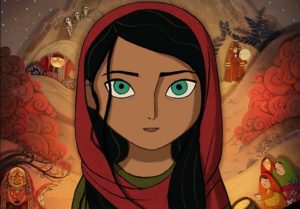It’s easy to have festival blinders on when you live in a town like Toronto, but for 365 days out of the calendar year there’s always some pretty interesting stuff going on at the TIFF Bell Lightbox.
With the TIFF Kids International Film Festival currently in full swing here in downtown Toronto from March 9th through to the 18th you may not have realized the incredibly diverse and fascinating cinema that has been gracing the screens of our fair city for the past few days. From shorts to features there is everything that fans both young and old will want to take in and is much more than just colourful and goofy animation. Everything has a theme, and everything has a purpose while still achieving the goals of being entertaining and that’s something that is so important to show to young audience members consuming media at a break neck speed.
I got the unique chance to sit down with Jennifer Barkin; the senior manager of programming for the TIFF Kids International Film Festival for a fascinating talk about the challenges and hurdles that you face when curating a film festival that is aimed at young people.
Dave Voigt: There’s something that really struck me while I was watching the Rise Up shorts program (playing during TIFF Kids) because you’re programming FOR kids because there is an inherent entertainment value to it all but at the same time you’re not pandering to that audience either and there is this delicate balance of needing to find entertaining films but also once that actually have something to say and from a programming aspect that really kind of fascinates me. When you are curating a festival like this one, what is the crux and mission statement that you need to go by when doing this job.
Jennifer Barkin: I think you just hit the nail on the head and took the words straight out of my mouth in a really weird way we always strive with the entirety of the festival we’ve never wanted it to be just something that was cutesy that happened organically. Across all of our shorts and all of our features , we’ve always had the bench mark that if we sit there and feel like we are getting something from it, then we are confident that a kid can. Granted they might be different things and we very obviously don’t want to put anything on screen that may traumatise anybody but we also want to be able to address some very difficult issues, ones that kids are also dealing with and I think that having these things presented on screen can often be an entry point for them in order for them to be able to have conversations that they may not have thought and be able to look at things in an entirely different perspective. It’s really kind of eye opening for them and especially in some of those more difficult programs when you get on stage and ask if anybody has any questions, and you just see a room silent with all their hands down and you wonder “What just happened?” But then once you start to talk about it and really begin to unpack the issues that were presented on screen then the kids hands start to fly up with anything from the general theme of the piece, to how they came up with it and a myriad of other angles on it and they get super engaged with it. Every year we always feel like there are one or two things where maybe we pushed it just a hair too far, but no everyone so far has always found something to engage with and having that entry point is just so important.
DV: Do kids ever come into this process because I mean as much as we’ve all been kids and have that past relationship with our childhood memories but we’re just not kids now. Do you look to any kids to see if things that you might be unsure about will or won’t work at the festival with an audience full of kids?
JB: Oh yeah, we’ve definitely gone to kids in the past, especially with things that have a bit more of a comic bent to them and we just aren’t sure of how funny it actually is to our key demographic. As well as being sure that we just aren’t shocking, traumatising or even bewildering any of our audience because that would obviously be pretty bad. That’s why we lean on so many of our programmers from the main festival who are well versed at watching things with their kids and knowing how to navigate any content landmines that might come up.
DV: Something else that really stood out for me and especially for young kids who may want to be filmmakers is how things really get started for young filmmakers. Everyone may want to go and make their version of Star Wars but they won’t instead they’ll start in short film as most burgeoning filmmakers do. Is there anything in place for the young viewers who may want to make films that you can steer them towards?
JB: Yeah, that kind of stuff really does start to come up in the Q&A sessions, especially considering how many student filmmakers we have in the fest and then audiences can get to see something that was a school assignment up on the big screen. With the details that some of these young filmmakers can bring to the Q&A’s it really makes the idea of filmmaking so much more accessible to the audience and something big and Hollywood that requires some big leap and being able to do this is an attainable thing. And always in support of that we do have the Jump Cuts showcase and it is a great tie back for kids in the audience to see how it really is all very similar.
DV: When the words “Kids Film” gets brought up to most parents, you can just see the fatigue in most of their eyes (room laughs) because most people really do have such a preconceived notion of what cinema for kids can really entail, but there is such a wide breadth of material in TIFF Kids and I am kind of curious, from your perspective how would you sell something like this to parents who are looking for an activity for their kids?
JB: That’s always been the challenge. I’ve always said that if I could talk to every parent and just tell them how worth it is, we’d be full every night. But I try to sum it down to this, yes it’s more screen time for your kids…but it’s the GOOD kind of screen time because there is content here that addresses issues, especially in the short programs and mostly in the one’s geared towards the older kids as they all have a topic or a theme to them and in watching that it’s what you hope comes through and sticks with people as they leave the cinema.
 Kids everywhere are talking about some pretty big issues and these programs that we show are designed to support that so kids can engage and go one step further with a variety of conversations out there in the world. It certainly can be a barrier at times for some parents, especially when it comes to foreign offerings and shorts but especially at our festival I really do feel like our shorts pack a really big punch. They have a lot going on in them and especially after we get some parents into their first shorts program it really isn’t uncommon to see them going to more and more of them, and they ‘get it’ and they excited about the form and being able to see something with a genuine emotional punch that doesn’t require you to commit 90 minutes to it. Shorts programs let audiences take chances, and if you don’t like the first one, all you really have to do is wait a few minutes until the next one starts.
Kids everywhere are talking about some pretty big issues and these programs that we show are designed to support that so kids can engage and go one step further with a variety of conversations out there in the world. It certainly can be a barrier at times for some parents, especially when it comes to foreign offerings and shorts but especially at our festival I really do feel like our shorts pack a really big punch. They have a lot going on in them and especially after we get some parents into their first shorts program it really isn’t uncommon to see them going to more and more of them, and they ‘get it’ and they excited about the form and being able to see something with a genuine emotional punch that doesn’t require you to commit 90 minutes to it. Shorts programs let audiences take chances, and if you don’t like the first one, all you really have to do is wait a few minutes until the next one starts.
TIFF Kids International Film Festival runs at the TIFF Bell Lightbox until Sunday March 18th and if you and your kid are looking for something a little different to do this spring break, then this is the answer for you as some of the best cinema for kids not only locally but from across the world is brought here for our enjoyment.


